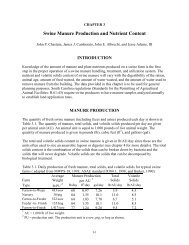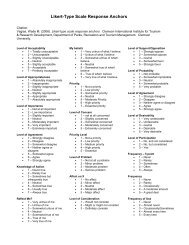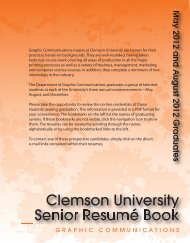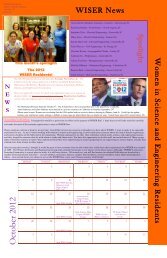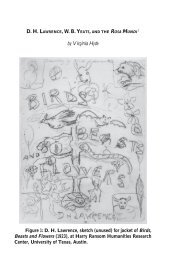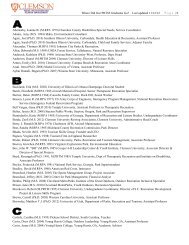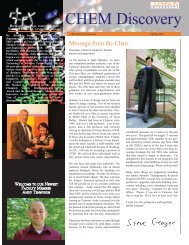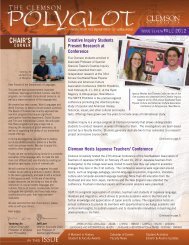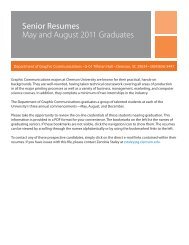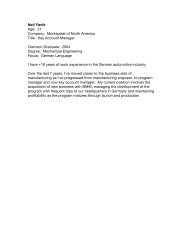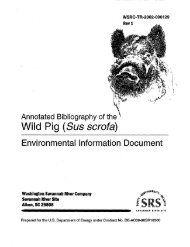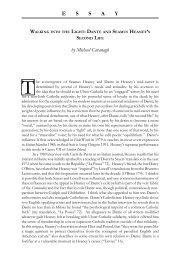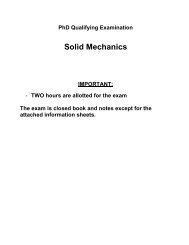Woolfian Boundaries - Clemson University
Woolfian Boundaries - Clemson University
Woolfian Boundaries - Clemson University
Create successful ePaper yourself
Turn your PDF publications into a flip-book with our unique Google optimized e-Paper software.
124 WOOLFIAN BOUNDARIES<br />
and Lewis’s Vorticist project Blast, Woolf subtly elides any mention of either Imagism or<br />
Vorticism here, comparing the response to what is experimental in Eliot’s poetry to looking<br />
at a Post-Impressionist painting. Eliot had no association with Post-Impressionism in<br />
England, the Fry-orchestrated avant-garde circle with which Woolf has consistently been<br />
linked. Perhaps the most signifi cant sign that she thought Eliot’s work important was her<br />
active role with Pound and others beginning in 1922 to create a fellowship so that he<br />
could quit his job at Lloyd’s of London and write full time. She cites Eliot as “one of the<br />
Georgians” in her 1924 essay “Character in Fiction,” asserting that he had “written some<br />
of the loveliest lines in modern poetry” (E3 434). And Eliot would remain for her through<br />
the 1920s the epitome of the “true poet.”<br />
Despite his importance during the teens and 20s in London literary circles, Pound<br />
is left out of Woolf’s public accounts of modern literature and its aesthetic, perhaps most<br />
notably in “Character in Fiction,” the essay that cogently articulates what is new about modernism,<br />
the literary movement beginning famously “on or about December 1910” (E3 421).<br />
Th e twelve years that had elapsed from that date included Pound’s call to “make it new” in<br />
London’s literary circles. Privately, however, she was more forthcoming. In contrast to her<br />
advocacy of Eliot’s poetry, about Pound’s poetry Woolf would say in a 1923 letter to Ottoline<br />
Morrell that she had “never seen him; and only hate his works” (L3 71). In a contemporaneous<br />
letter to Fry she compares the two American poets. First she acknowledges to Fry that<br />
she had been in correspondence with Pound regarding the Eliot fund, which had resulted in<br />
“a complete muddle, as you may imagine.” Eliot’s psychology about the eff orts on his behalf<br />
fascinate her, however; he had been embarrassed about the venture to raise money for him,<br />
a set of feelings that Woolf imagines as “Very American.” “Th e more I see of that race the<br />
more I thank god for my British blood,” she says, “which does at any rate preserve one from<br />
wearing 3 waistcoats; enamel buttons on one’s overcoat, and keeping one’s eyes perpetually<br />
shut—like Ezra Pound” (L2 572). Th e inside joke between Woolf and Fry about American<br />
clothing fashion notwithstanding, it is her assessment of Pound’s self imposed blindness that<br />
indicates what she thinks of his poetics. Pound argues that Imagism and Vorticist poetics are<br />
primarily visual, based on how a poet perceives the world through his or her eyes, and that<br />
the poem presents that fi xed image to “record the precise instant when a thing outward and<br />
objective transforms itself, or darts into a thing inward and subjective,” as he explains in his<br />
“Vorticism” essay (Gaudier-Brzeska 103). In her letter to Fry then, Woolf expresses a pointed<br />
critique of Pound by asserting that his eyes were “perpetually shut,” especially since, with<br />
Jacob’s Room, her idea of a “new form for a new novel” (D2 13) privileges visuality as one of<br />
its primary modes of apperception and expression.<br />
Woolf returned to thinking and writing about poetry, poetics, and status in the late<br />
1920s, especially when she was working out her argument regarding women and the<br />
history of poetry for A Room of One’s Own. A pattern emerges in her diary from this<br />
period when we trace her thinking about poetry and about her own status as a writer.<br />
Th e reception of Orlando, “which surpassed expectations,” was accompanied by Rebecca<br />
West’s praise of the book, calling it in her review “a poetic masterpiece of the fi rst rank.”<br />
Woolf’s mixed response to the praise and the record sales of her book leave her feeling<br />
“sheepish & silly” (D3 200), but also very aware of her “famous self tapering about the<br />
world.” Simultaneously, while she’s thinking about her fame, she works on “Women and<br />
Fiction” and writes, “as usual, I am bored by narrative.” So, fi nding narrative tedious, she



